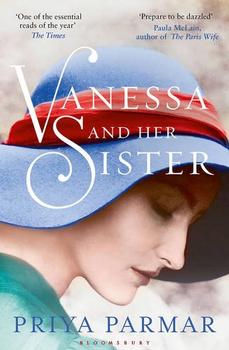Book Club Discussion Questions
Want to participate in our book club? Join BookBrowse and get free books to discuss!
Please be aware that this discussion guide will contain spoilers!
- When the novel opens, their father has died and the Stephen siblings have moved from their childhood home in Kensington to bohemian Bloomsbury. Why do you think Vanessa chose to uproot her siblings and move to such a radically different part of town? What sort of change is she trying to bring about for her family?
- Vanessa tells us that her family value words and books over painting and visual arts. How do you think growing up in such a family affected Vanessa's view of herself as an artist? Would you rather be a writer or a painter?
- Vanessa has always protected and supported Virginia, and has excused much of her difficult and unsocial behavior. Do you think Vanessa's tolerance gives Virginia permission to behave in the way that she does?
- What is your opinion of Virginia and Vanessa's relationship? Before Vanessa's betrayal, did you find them to be legitimate friends, or do you feel something was missing between them even before Vanessa married Clive? How does Vanessa's view of her sister change after she marries?
- Vanessa turns down several proposals from Clive, but decides to accept him after Thoby dies. Do you feel that if Thoby had lived, Vanessa might have chosen a different path? Or that Virginia might not have behaved as she did? Do you think Vanessa and Clive are well-suited to each other?
- Virginia feels contempt for Clive and thinks him an unsuitable husband for her sister. Why does she seek to "find a place" in Vanessa's marriage? What do you think Virginia hopes to achieve?
- We often think of the early twentieth century as being a time of almost Victorian restraint, yet the Bloomsbury Group were open about both homosexual and heterosexual love. Do you think they were utterly unique? Do you believe such openness was actually more common at the time than we traditionally believe?
- The Bloomsbury Group not only challenged the norms of the time, but challenged each other during their numerous discussions about art, writing, philosophy, economics and even love. Vanessa at times feels she is out of her depth, and marvels at Virginia's brilliance. Do you agree with her assessment of herself? How difficult do you feel it would have been to be a part of such a talented and intelligent circle?
- At one point Vanessa reflects, "If Virginia were not my sister, we would be a pedestrian cliché. Instead, we are a bohemian nightmare." How do you feel the ideals of the Bloomsbury Group influenced Vanessa's reaction to not only Clive's affair with Virginia, but his choice to resume physical relations with Mrs. Raven Hill? If you had been in her shoes, do you feel you would have responded differently?
- The story opens with a letter from Virginia to Vanessa stating, "What happened cannot break us. It is impossible. Someday you will love and forgive me. Someday we will begin again." How did this letter color your reading of the rest of the novel? Did you expect Vanessa to forgive Virginia at any point? Do you think it is fair to say that Vanessa still loves her sister, despite that fact that she ultimately decides she cannot forgive her? Do you agree with Vanessa's decision?
- Vanessa and Her Sister is told largely through excerpts from Vanessa's diary and her letters, with snippets of correspondence between her family and friends. What did you think of this narrative style? Was there any one person whose perspective you wished to see more often? How objective did you feel Vanessa's portrayal of the story was?
- Of the two sisters, Virginia is undoubtedly the more famous. Were you surprised by anything you learned about her in this novel? Did it challenge any previous ideas you had about her?
- At the end of the novel, the author gives a brief description of what became of the members of the Bloomsbury Group. Was there anything in there you found unexpected? Disappointing? Particularly satisfying?
Unless otherwise stated, this discussion guide is reprinted with the permission of Ballantine Books.
Any page references refer to a USA edition of the book, usually the trade paperback version, and may vary in other editions.




